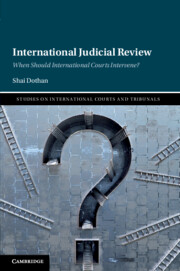Book contents
- International Judicial Review
- Studies on International Courts and Tribunals
- International Judicial Review
- Copyright page
- Dedication
- Contents
- Acknowledgments
- 1 Introduction
- 2 The Argument from Normative Legitimacy
- 3 The Argument from Systemic Epistemic Superiority
- 4 Why International Courts Improve Deliberation
- 5 Who Should Participate in the Courts’ Proceedings?
- 6 Creating the Right Incentives
- 7 Conclusions
- Bibliography
- Index
7 - Conclusions
Published online by Cambridge University Press: 14 February 2020
- International Judicial Review
- Studies on International Courts and Tribunals
- International Judicial Review
- Copyright page
- Dedication
- Contents
- Acknowledgments
- 1 Introduction
- 2 The Argument from Normative Legitimacy
- 3 The Argument from Systemic Epistemic Superiority
- 4 Why International Courts Improve Deliberation
- 5 Who Should Participate in the Courts’ Proceedings?
- 6 Creating the Right Incentives
- 7 Conclusions
- Bibliography
- Index
Summary
Chapter 7 concludes the book by providing a wider theoretical perspective on the intervention of international courts in domestic affairs. First, the chapter compares established theories of domestic judicial review to the insights this book developed on "international judicial review" – namely intervention by international courts. The literature on domestic judicial review is rich and often inspiring, but international courts face special circumstances that make drawing comparisons with domestic judicial review a complicated undertaking. Finally, to elaborate on the special conditions faced by international courts, the chapter outlines the characteristics of the global arena today: a complicated network with links that cut across national boundaries and formal hierarchies.
- Type
- Chapter
- Information
- International Judicial ReviewWhen Should International Courts Intervene?, pp. 133 - 142Publisher: Cambridge University PressPrint publication year: 2020

